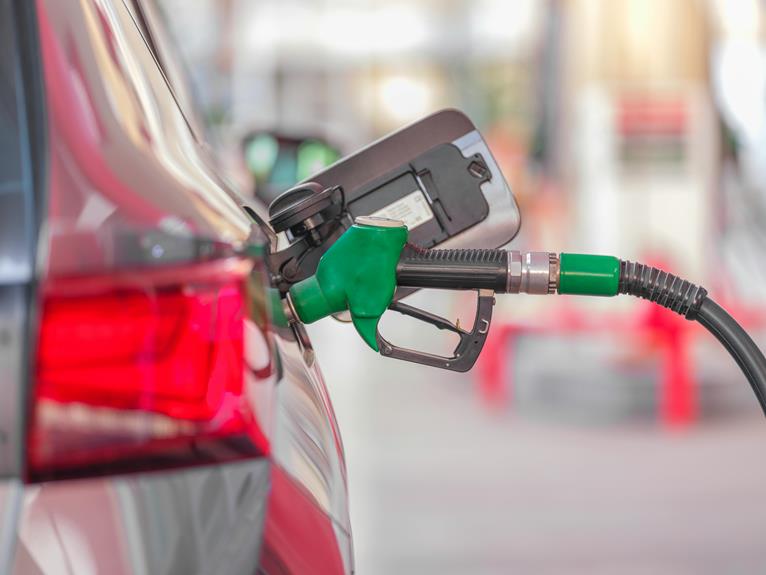
When it comes to enhancing your car's fuel efficiency, there are several practical steps you can take to make a noticeable difference. From simple maintenance routines to adjusting your driving style, each action plays a part in optimizing your vehicle's gas mileage. By focusing on these key aspects, you can unlock the potential for improved fuel economy and get the most out of every drop of gas. So, are you ready to explore these strategies and start driving smarter to save more at the pump?
Regular Maintenance
To keep your car's fuel efficiency at its best, regularly scheduled maintenance is crucial. By following the manufacturer's recommended maintenance schedule, you can ensure that your vehicle is running smoothly and efficiently. This includes regular oil changes, air filter replacements, tire rotations, and spark plug checks. Neglecting these routine maintenance tasks can lead to decreased fuel efficiency and potential costly repairs down the road.
In addition to the basic maintenance tasks, it's important to pay attention to warning lights on your dashboard. These indicators can alert you to potential issues that, if addressed promptly, can help maintain your car's fuel efficiency. Ignoring warning lights can lead to more severe problems that not only affect fuel efficiency but also pose safety risks.
Regular maintenance not only keeps your car running efficiently but also extends its lifespan. By investing time and money in routine maintenance, you can save money in the long run by avoiding major repairs and ensuring optimal fuel efficiency.
Efficient Driving Habits
Implement simple driving adjustments to maximize your car's fuel efficiency. One key habit to adopt is maintaining a steady speed while driving. Rapid acceleration and braking can significantly decrease your fuel economy. By driving smoothly and avoiding sudden stops, you can conserve fuel and reduce overall consumption. Additionally, try to anticipate traffic flow and road conditions to avoid unnecessary speed changes.
Another efficient driving habit is to reduce idling. If you anticipate being parked for more than a minute, it's more fuel-efficient to turn off your engine and restart when needed. Idling burns fuel without moving your car, so minimizing idle time can lead to fuel savings in the long run.
Furthermore, using cruise control on highways can help maintain a consistent speed, which is more fuel-efficient than constantly adjusting your speed manually. Remember to use cruise control on flat roads to maximize its benefits.
Proper Tire Inflation
Maintaining optimal tire pressure is crucial for maximizing your car's fuel efficiency. Proper tire inflation ensures that your tires have the right amount of contact with the road, reducing rolling resistance and improving fuel economy. When your tires are underinflated, more of the tire's surface area touches the road, causing increased friction and making your engine work harder to maintain speed. This can lead to decreased fuel efficiency and more frequent trips to the gas station.
On the other hand, overinflated tires can also be problematic. They may provide less traction, leading to unsafe driving conditions, and wear out unevenly, reducing their lifespan. To find the recommended tire pressure for your vehicle, refer to the owner's manual or the sticker located on the driver's side door jamb. It's essential to check your tire pressure regularly, preferably once a month, using a reliable pressure gauge.
Fuel Type Selection
Selecting the appropriate fuel type for your vehicle is essential for optimizing performance and fuel efficiency. The type of fuel you choose can have a significant impact on how efficiently your car runs. If your vehicle requires regular gasoline, using a higher octane fuel won't improve performance or fuel economy. On the other hand, if your car is designed for premium gasoline, using regular fuel may cause engine knocking and reduce efficiency.
Diesel fuel is another option to consider, especially if you have a diesel engine. Diesel engines are known for their fuel efficiency and can provide better mileage compared to gasoline engines. However, diesel fuel tends to be more expensive than regular gasoline, so it's essential to calculate if the increased fuel efficiency offsets the higher cost.
When deciding on a fuel type, also consider alternative fuels such as ethanol blends or electric power. Ethanol blends can be used in flex-fuel vehicles and offer a greener alternative to traditional gasoline. Electric vehicles are becoming increasingly popular due to their zero emissions and lower operating costs in the long run. Before switching to an alternative fuel type, make sure your vehicle is compatible and that you have access to the necessary refueling infrastructure.
Vehicle Weight Reduction
Considering ways to improve your car's fuel efficiency, reducing the weight of your vehicle can have a significant impact on its overall performance and gas mileage. Every extra pound your car carries requires more fuel to move it, so by lightening the load, you can enhance your vehicle's efficiency.
Start by removing unnecessary items from your trunk or back seats. These items may seem insignificant, but their cumulative weight can affect your fuel consumption. Additionally, consider using lighter materials when possible, such as carbon fiber or aluminum, for parts like wheels or body panels. Upgrading to lighter aftermarket components can also contribute to weight reduction.
Moreover, regular maintenance is crucial to prevent unnecessary weight from accumulated dirt, debris, or rust. By focusing on reducing your vehicle's weight, you can optimize fuel efficiency and save money on gas in the long run.




